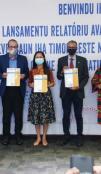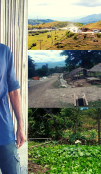European Union and KOICA Support Mercy Corps & Similie in the Launch of a Partnership for Dili Flood Early Warning System

After more than six months of collaboration with government partners for the scoping and design of early warning systems, Mercy Corps and Similie with support from the Korea International Cooperation Agency and the European Union are excited to announce the launch of a Dili-based flood early warning system, targeting major rivers with flood risk in Dili. While this system will unfortunately come too late for April's devastating floods in Dili, it will help prepare Dili for any future floods that the capital will face. The recent flooding has underscored the critical importance of disaster risk reduction initiatives including early warning alerts in the capital, with investments needed to assist communities to protect lives and assets.
With funding from the Korea International Cooperation Agency (KOICA) and the European Union, the flood early warning system will be implemented by Similie and Mercy Corps. Since establishing operations in Timor-Leste in 2007, Mercy Corps has promoted community-led, market-based approaches to addressing key challenges to improved wellbeing through greater resilience, resolved root causes of poverty, and inclusive economic growth. Mercy Corps Timor-Leste is currently working in Dili on the KOICA-funded PREPARADU program to improve flood and tsunami preparedness. Through PREPARADU, Mercy Corps is working closely with communities and government to ensure that flood and tsunami risk zones are mapped, response plans are developed and practiced, and emergency response personnel and communities have the capacity to respond to disasters. With funding from the European Union, Mercy Corps’ new Maloa Urban Resilience Initiative program aims to address the increasing impacts of climate change and flooding in the Maloa watershed area, and the resulting economic losses sustained by households and businesses in the watershed area. Through a cross-cutting focus on environmental, social, and economic challenges, the European Union and Mercy Corps expect to reach 20,000 people living in the Maloa watershed area with improved knowledge, skills, and resources to cope with these challenges.
Similie is a for-profit social enterprise that provides sustainable technology solutions for emerging markets throughout the Asia-Pacific. Similie has developed a suite of technologies that provide a locally influenced, end-to-end early warning system with timely and relevant risk information about floods, for government. Similie’s people-centered approach is central to the sustainable deployment of the early warning system and will feature through the design, implementation, and operations training of the Dili Flood Early Warning System. The system will be designed in collaboration with the Government of Timor-Leste including Civil Protection (National Directorate for Disaster Management and the Disaster Operations Centre (NDOC)); the National Directorate for Meteorology and Geophysics (DNMG), and the Institute of Petroleum and Geophysics (IPG). Scoping work on the Dili Flood Early Warning System with the Government of Timor-Leste identified four priority catchments: Becora, Becusi, Kuluhun, and Maloa (with potential future expansion to Comoro and Hera) and recommended up to 40 potential monitoring sites across these areas in addition to monitoring sites in the Dili metropolitan area.
These monitoring sites will provide information about local catchment conditions that will be linked to global weather forecasting through Similie’s cloud-based platform, and monitored against early warning thresholds to trigger early warning alerts at three different categories: Attention, Special Attention, and Alert. These alerts will be shared with the Government of Timor-Leste for analysis and distribution.
For effective delivery of the Dili Flood Early Warning System, Mercy Corps and Similie with support from KOICA and the European Union will continue to take a strong collaborative approach with the Government of Timor-Leste in all decisions related to the Flood Early Warning System, including monitoring site selection, threshold settings, and the communication of alerts.





